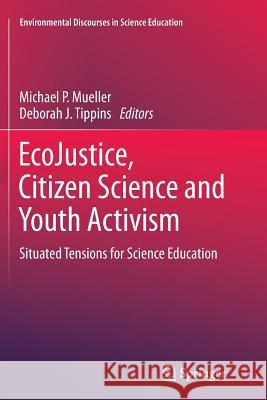Ecojustice, Citizen Science and Youth Activism: Situated Tensions for Science Education » książka



Ecojustice, Citizen Science and Youth Activism: Situated Tensions for Science Education
ISBN-13: 9783319349572 / Angielski / Miękka / 2016 / 460 str.
Ecojustice, Citizen Science and Youth Activism: Situated Tensions for Science Education
ISBN-13: 9783319349572 / Angielski / Miękka / 2016 / 460 str.
(netto: 421,70 VAT: 5%)
Najniższa cena z 30 dni: 385,52
ok. 16-18 dni roboczych.
Darmowa dostawa!
This volume draws on the ecojustice, citizen science and youth activism literature base in science education and applies the ideas to situated tensions as they are either analyzed theoretically or praxiologically within science education pedagogy.
Mueller and Tippins have edited a timely book and the first one of the new Springer Book Series Environmental Discourses in Science Education addressing the urgent need to bridge environmental education and science education. This collection pulls together a diversity of reflections and experiences in a brilliant attempt to establish synchrony between ecojustice philosophy, youth activism and citizen science: three areas that have become an important locus for critical science education at present. I believe this book can strongly contribute to the never ending debate on scientific literacy by providing new views and experiences highlighting alternative ways of doing science education.
Mariona Espinet, Science and Mathematics Education Department, Universitat Autònoma de Barcelona, Catalonia, Spain
The authors of this book are all pioneers in meaningful educational transformation. The stories they tell, and the forms these stories take, are incredibly diverse and inspiring-ranging from the pedagogies of farming in Appalachia and New England, to the politics of systems thinking in Texas just north of the Mexican border, to climate change pedagogies in Native communities. As the authors point out, each of these local stories of change has global significance. What holds it all together is an ethic of ecojustice. Here the authors skillfully demonstrate the necessity and power of bridging social and ecological vision in a wide variety of educational contexts in need of change.
David A. Greenwood, Lakehead University, Thunder Bay, ON, Canada
Ecojustice, Citizen, and Youth Activism: Situated Tensions for Science Education, the first book in the series Environmental Discourses in Science Education, speaks to all types of educators-teachers, students, parents, citizens. It is a call for the restoration of curiosity, diversity, and value systems that embrace person, social, and civic responsibility for the Earth, including both human and non-human species. This collection of inspirational essays, personal narratives and empirical research provides rich examples of how interdisciplinary and intergenerational groups engage simultaneously in meaningful learning and advocacy through projects that are situated in a range of cultures and contexts. This book undoubtedly will inspire and inform conversations about a future for science education that awakens our individual and collective critical understanding of and engagement in local, national, and global ecojustice issues.
Lynn A. Bryan, Professor of Science Education, Purdue University, West Lafayette, IN, USA
At last, science educators are breaking down the rigid walls of their discipline and embracing the world at large, developing socially responsible science curricula and pedagogies for the 21st Century. Driven by a moral commitment to sustaining the cultural and environmental heritage of the planet, eco-conscious science educators worldwide are empowering young people to become environmental activists and stewards. The visionary contributors to this timely book present a broad range of ecojustice inspired science programs for schools, universities and local communities. This book is a rich resource for science educators preparing future citizens with higher-level abilities for participating in the global agenda of sustainable development.
Peter Charles Taylor, Professor of STEAM Education, Murdoch University, Australia
Put Away Your Pencils-Reconceptualizing School Accountability through EcoJustice.- Provoking EcoJustice-Taking Citizen Science and Youth Activism Beyond the School Curriculum.- The Sustainable Farm School-Waldorf Philosophy and EcoJustice Theory in Aesthetic Contexts.- Building Teacher Leaders and Sustaining Local Communities through a Collaborative Farm to School Education Project-What EcoJustice Work Can PreService Teachers Do?.- Drawing on Place and Culture for Climate Change Education in Native Communities.- The Will of the Ancestors: A Collaborative Elementary Science Curriculum Design Initiative.- Eco, Social, or Any Other Justice? Critical Awareness among International Service-Learning Program Participants in Costa Rica.- Art to Capture Learning about the Longleaf Pine Ecosystem-Why a Picture is Worth a Thousand Words.- Ponder This? Editorial by J Myron Atkin.- The Commonplaces of Schooling and Citizen Science-Editorial by Xavier Fazio and Doug Karrow.- Living History-Challenging Citizen Science and Youth Activism through Historical Re-enacting.- Teaching with Citizen Science-It’s More than Just Putting Out Fires!.- Carrizo Springs, Texas-The Story of the Systems Academy for Young Scientists (SAYS).- Mediated Pedagogy in a Blended Environment: Impact of Processes and Settings.- Why the Secret of the Great Smoky Mountains Institute at Tremont Should Influence Science Education-Connecting People and Nature.- Democratic Participation with Scientists through Socioscientific Inquiry.- Ponder This? Editorial.- Youth Activism-Editorial.- Balancing Economic Utility with Civic Responsibility.- Pursuing Youth-led Socioscientific Activism: Conversations of Participation, Pedagogy, and Power.- Harnessing Youth Activism with/in Undergraduate Education: A Case Study of Change Lab.- Science and Democracy in Youth Environmental Action-Learning “Good” Thinking.- Hitting the Big Screen-Urban Youth Activism through Documentary Film.- From Citizen Diplomacy to Youth Activism: The Story of the Global Thinking Project.- Seeing the Forest for the Trees! Conservation and Activism through Socioscientific Issues for Young Children.- Ponder This? Editorial by Angela Calabrese Barton.
This volume draws on the ecojustice, citizen science and youth activism literature base in science education and applies the ideas to situated tensions as they are either analyzed theoretically or praxiologically within science education pedagogy. It uses ecojustice to evaluate the holistic connections between cultural and natural systems, environmentalism, sustainability and Earth-friendly marketing trends, and introduces citizen science and youth activism as two of the pedagogical ways ecojustice philosophy can be enacted. It also comprises evidence-based practice with international service, community embedded curriculum, teacher preparation, citizen monitoring and community activism, student-scientist partnerships, socioscientific issues, and new avenues for educational research.
1997-2026 DolnySlask.com Agencja Internetowa
KrainaKsiazek.PL - Księgarnia Internetowa









